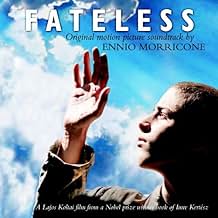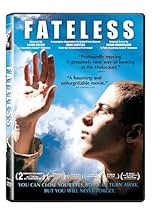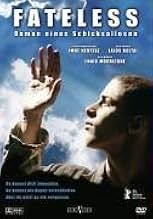PUNTUACIÓN EN IMDb
7,0/10
7,3 mil
TU PUNTUACIÓN
La vida de György, de 14 años, se desmorona en la Hungría de la Segunda Guerra Mundial, cuando es deportado primero a Auschwitz y luego a Buchenwald.La vida de György, de 14 años, se desmorona en la Hungría de la Segunda Guerra Mundial, cuando es deportado primero a Auschwitz y luego a Buchenwald.La vida de György, de 14 años, se desmorona en la Hungría de la Segunda Guerra Mundial, cuando es deportado primero a Auschwitz y luego a Buchenwald.
- Premios
- 6 premios y 7 nominaciones en total
Dániel Szabó
- Moskovics
- (as Dani Szabó)
Argumento
¿Sabías que...?
- CuriosidadesThe production unexpectedly ran out of money halfway through and halted for several months in order to find new investors. This ended up working in its favor, since Marcell Nagy was going through puberty, and by the time they restarted, he looked physically more mature, taller, and his voice deeper. By the time his character enters and survives the death camp, he looks several years older than when the film began, adding an element of reality that otherwise would have been created with make-up.
- Citas
[last lines]
György Köves: [narrating] People only ask about the horrors, whereas I should talk about the happiness of the camps next time, if they ask. If they ask at all. And if I don't forget myself.
- Créditos adicionalesFlash v. Schwabenland, Production Dog
- Banda sonoraHoldvilágos éjszakán (On a Moonlit Night)
Music by Mihály Eisemann
Lyrics by István Zágon
Sung by the four boys when the group is in transit
Reseña destacada
There have been many films about the holocaust but none quite as intimate and personal as Hungarian director Lajos Koltai's Fateless. Based on the semi-autobiographical novel by Nobel Prize winner Imre Kertesz, Fateless is a hauntingly beautiful film whose narrative unfolds in the form of miniature vignettes rather than peak dramatic moments. The film is seen from the perspective of 14-year-old Gyuri Koves (Marcell Nagy), who spent a year in Buchenwald during the last days of World War II and who provides the narration. Unlike most films about the holocaust, it suggests that happiness and beauty can co-exist along with deprivation and despair.
Marcell Nagy is outstanding as Gyuri, the young man who moves from a childlike innocence to world-weariness in the span of one year. With his soulful face and expressive eyes, he is almost a detached observer, quietly pondering his fate. He is, in the Sufi saying, in the world, but not of it and the film unfolds as in a lucid dream that blurs the lines between appearance and reality. Koltai captures this almost matter-of-fact quality as Gyuri says goodbye to his father (Janos Ban) who has been ordered to work in a Nazi labor camp. Because Hungarians did not feel the full brunt of Nazi persecution until the Nazi takeover in 1944, Gyuri thinks his father is just going to have to work hard and that nothing will happen to him. Neighbors and relatives who reassure him that everything will be all right do not further his grasp of reality.
When the boy and his friends are detained on a bus on the way to work, he learns quickly that "his carefree childhood days are now over". Still not comprehending the magnitude of what is taking place, he is annoyed but not frightened and does not seize the opportunity to escape offered by a friendly cop. Even when he arrives at Auschwitz, he sits on the ground shaven and wearing a striped uniform, talking with friends as if he was in a school playground during recess. When Gyuri discovers that "he could be killed at any time, anywhere", he attains a sort of spiritual freedom and his determination to survive is increased. Pretending to be sixteen, Gyuri escapes the gas chamber and is sent to Buchenwald and then to a smaller camp.
The scenes of murder, death, and dying at the camps are thankfully left to the imagination and the film focuses on Gyuri's personal reactions to what he sees around him. Koltai, a cinematographer for twenty-five years, creates a visual cinematic poem in which his color palette is so muted that we experience the mud and the atmosphere of cold and gray almost viscerally. Sadly, we watch Gyuri's transformation from the confident teenager we saw at the beginning to an emaciated number, his leg so swollen and infected that he can barely walk. In voice-over, however, he talks about the hours between work and the evening meal as one of quiet reflection and about the joy in discovering a piece of meat or potato in his soup. He is also sustained by a friend he develops in fellow Hungarian Bandi Citrom (Aron Dimeny) who protects him and tries to teach him the skills of survival. Bandi, ever the optimist, proclaims, "I will walk down Nefelejcs Street again" One of the surprises in the film is the treatment Gyuri receives at what looks like a camp hospital.
He is cleaned, allowed to sleep alone in a bed and taken care of, a set of circumstances not usually associated with extermination camps, yet based on Kertesz' actual experience. The most discussed aspect of the film, however, takes place in Budapest after the liberation. Gyuri feels more alone than he did at Buchenwald and even expresses a sort of homesickness for the camaraderie he felt at the camp. Friends and neighbors who were not in the camps cannot understand what it was truly like and Gyuri cannot explain it. Even if he could, no one really wants to hear anything that rattles their preconceptions.
He rebels at playing the role of the victim and says, "there is nothing too unimaginable to endure". When asked about the atrocities, he talks of his happiness. "The next time I am asked", he says, "I ought to speak about that, the happiness of the concentration camp. If indeed I am asked. And provided I myself don't forget". His "happiness", according to Kertesz, who also wrote the screenplay, is not a form of denial but an act of rebellion against those who do not see him any longer as a human being, only as a victim. It was a way of assuring his responsibility, of defining his own fate rather than having others decide it for him. For me, it also added a portal into the sublime.
Marcell Nagy is outstanding as Gyuri, the young man who moves from a childlike innocence to world-weariness in the span of one year. With his soulful face and expressive eyes, he is almost a detached observer, quietly pondering his fate. He is, in the Sufi saying, in the world, but not of it and the film unfolds as in a lucid dream that blurs the lines between appearance and reality. Koltai captures this almost matter-of-fact quality as Gyuri says goodbye to his father (Janos Ban) who has been ordered to work in a Nazi labor camp. Because Hungarians did not feel the full brunt of Nazi persecution until the Nazi takeover in 1944, Gyuri thinks his father is just going to have to work hard and that nothing will happen to him. Neighbors and relatives who reassure him that everything will be all right do not further his grasp of reality.
When the boy and his friends are detained on a bus on the way to work, he learns quickly that "his carefree childhood days are now over". Still not comprehending the magnitude of what is taking place, he is annoyed but not frightened and does not seize the opportunity to escape offered by a friendly cop. Even when he arrives at Auschwitz, he sits on the ground shaven and wearing a striped uniform, talking with friends as if he was in a school playground during recess. When Gyuri discovers that "he could be killed at any time, anywhere", he attains a sort of spiritual freedom and his determination to survive is increased. Pretending to be sixteen, Gyuri escapes the gas chamber and is sent to Buchenwald and then to a smaller camp.
The scenes of murder, death, and dying at the camps are thankfully left to the imagination and the film focuses on Gyuri's personal reactions to what he sees around him. Koltai, a cinematographer for twenty-five years, creates a visual cinematic poem in which his color palette is so muted that we experience the mud and the atmosphere of cold and gray almost viscerally. Sadly, we watch Gyuri's transformation from the confident teenager we saw at the beginning to an emaciated number, his leg so swollen and infected that he can barely walk. In voice-over, however, he talks about the hours between work and the evening meal as one of quiet reflection and about the joy in discovering a piece of meat or potato in his soup. He is also sustained by a friend he develops in fellow Hungarian Bandi Citrom (Aron Dimeny) who protects him and tries to teach him the skills of survival. Bandi, ever the optimist, proclaims, "I will walk down Nefelejcs Street again" One of the surprises in the film is the treatment Gyuri receives at what looks like a camp hospital.
He is cleaned, allowed to sleep alone in a bed and taken care of, a set of circumstances not usually associated with extermination camps, yet based on Kertesz' actual experience. The most discussed aspect of the film, however, takes place in Budapest after the liberation. Gyuri feels more alone than he did at Buchenwald and even expresses a sort of homesickness for the camaraderie he felt at the camp. Friends and neighbors who were not in the camps cannot understand what it was truly like and Gyuri cannot explain it. Even if he could, no one really wants to hear anything that rattles their preconceptions.
He rebels at playing the role of the victim and says, "there is nothing too unimaginable to endure". When asked about the atrocities, he talks of his happiness. "The next time I am asked", he says, "I ought to speak about that, the happiness of the concentration camp. If indeed I am asked. And provided I myself don't forget". His "happiness", according to Kertesz, who also wrote the screenplay, is not a form of denial but an act of rebellion against those who do not see him any longer as a human being, only as a victim. It was a way of assuring his responsibility, of defining his own fate rather than having others decide it for him. For me, it also added a portal into the sublime.
- howard.schumann
- 12 feb 2006
- Enlace permanente
Selecciones populares
Inicia sesión para calificar y añadir a tu lista para recibir recomendaciones personalizadas
- How long is Fateless?Con tecnología de Alexa
Detalles
- Fecha de lanzamiento
- Países de origen
- Sitios oficiales
- Idiomas
- Títulos en diferentes países
- Sense destí
- Localizaciones del rodaje
- Empresas productoras
- Ver más compañías en los créditos en IMDbPro
Taquilla
- Presupuesto
- 2.500.000.000 HUF (estimación)
- Recaudación en Estados Unidos y Canadá
- 196.857 US$
- Fin de semana de estreno en EE. UU. y Canadá
- 12.680 US$
- 8 ene 2006
- Recaudación en todo el mundo
- 2.512.009 US$
- Duración2 horas 20 minutos
- Color
- Mezcla de sonido
- Relación de aspecto
- 2.35 : 1
Contribuir a esta página
Sugerir un cambio o añadir el contenido que falta




























